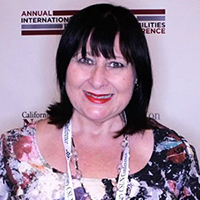Interview: Sharon Kerr

Pathways14 themes are inclusive, innovative and ingenuity, can you tell us about your work and research related to this?
The title of my research is “White Questions, Black Answers”. Working in support services and running programs to support students with disability for almost 20 years I found very few, if none, were identifying as indigenous students with a disability. This is what started my white questions to find out the Black answers.
What could we do to better serve our indigenous students with disabilities? As a teacher, you do anything to communicate effectively, in a support role you will do anything to support students you are there to serve.
In order to be culturally safe, I did a Masters in Indigenous Education, I have an Indigenous advisor group and an Indigenous supervisor in Dr John Gilroy. Aside from the usual sorts of farming the literature, which encompasses very little at the intersection of indigenous and disability, I’ve been listening to experiences of these students, with the aim of developing a framework or at the very least shining a light on the main challenges that students are facing so that student services can support people appropriately.
Why are they not presenting for support, what are the barriers and how is disability perceived by ATSI community generally?
How does culture and cultural understandings of disability impact appropriate provision of support for Aboriginal and Torres Strait Islander people with disability?
People have a hesitation to identify with yet another label, they do not focus on a disability and do not acknowledge it as such i.e. They may identify as not being able to hear very well rather than person with disability who has a hearing impairment.
I had a student in her final year who was legally blind, however did not identify as having a disability. I think there is also a perception that help may not be offered and a fear of being judged. However, you don’t know what you don’t know; If you think you’re not so good at something like reading, you may not be aware you have a reading disorder unless you have support systems or knowledge in place to identify this.
I think a lot of the problems exist for people in starting to put up their hand and asking for help. I did an audit of Australian University websites during the last election and will do so during the next election. It was interesting to see that the Disability Support for universities is primarily in one camp and indigenous services is in another, with very little crossover.
For example, of 40 universities, 33 did not indicate support available for student with a disability on their indigenous support page. None of the 40 universities had information on their Disabilities website for Indigenous staff or support contacts.
As a non-Indigenous person, what are your critical success factors in engaging with Indigenous people?
You need to approach the relationships, all relationships for that matter, with respect, an open heart, open minds and a desire to learn. And then be prepared to respond.
The catch cry has been for people to listen to Indigenous voices, a lot have, but after this have done nothing with the knowledge that has been shared. There is a burden or responsibility to respond or act once we are aware of what the situation is.
Higher education institutions are a melting pot for multiculturalism in both students and staff, which has brought up discussions around epistemology. How do you think the structure of our current system of learning, with a leaning towards colonial western academia, impacts students who do not align with that background?
This question is another thesis in itself. If we are talking about people being respected for who they are, this comes down to the cultural safety of the institution, that all staff are respecting, listening and understanding their ATSI students.
What’s far more fundamental than the philosophy of education, is major concerns regarding assumptions of affluence, access to technology, access to study spaces, economic security, safe accommodation – these are issues that I think are most important
Of the 40 universities, only 7 provided the opportunity for ATSI students to seek support without medical documentation. 1 university noted a 10-step process to acquire a Learning Action Plan. 1 university also noted the need for them to have documentary evidence of their aboriginality. If you’re an indigenous student looking at all of this, it’s likely you would rather continue as per the status quo rather than seek support.
What skills do you hope to people who attend your session leave with?
I really hope they will listen to some of the issues that face indigenous students with a disability and look internally at their own institutions and be dedicated to responding.
I look at an array of impact factors, which impact students differently depending on institution. I’m promoting a deep push for support in being flexible, relating closely with indigenous support services and linkages to what they’re providing to remove divisions between being either an ATSI student or a Disability Student.
We should be creative and innovative in what we as Disability Practitioners know about technologies, practices and methodologies so that educators can action universal design for learning, access to assistive technologies and all supports.
Advocate for change to better serve indigenous students at your institution.

